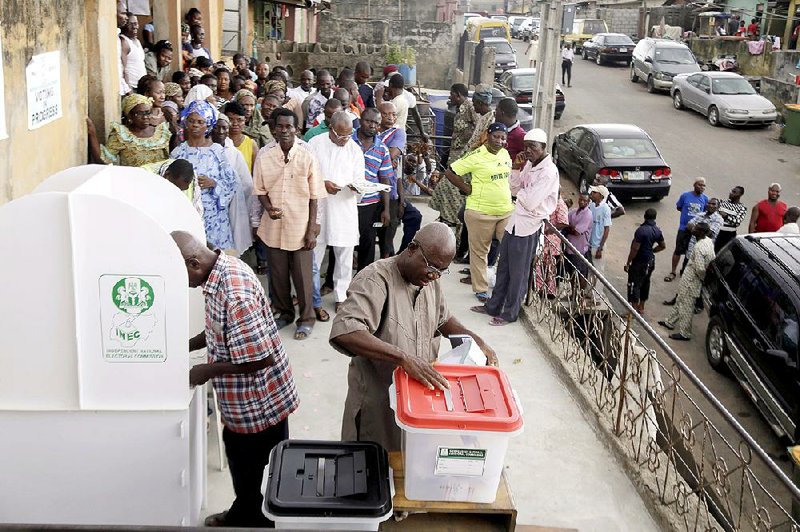ABUJA, Nigeria -- Boko Haram fighters attacked poll stations in northeast Nigeria and a governor demanded elections be canceled in an oil-rich southern state Sunday as the count started for a presidential election too close to call.
Two electoral workers were killed Saturday in Boko Haram's campaign to disrupt the elections, chairman Attahiru Jega of the Independent National Electoral Commission said.
Voting continued in certain areas Sunday after technical glitches with new biometric card readers prevented some people from casting ballots Saturday.
The high-stakes contest to govern Africa's richest and most populous nation has come down to a close contest between President Goodluck Jonathan, a 57-year-old Christian from the south, and former military dictator Muhammadu Buhari, 72, from the predominantly Muslim north.
Results are expected by late today. If there is no clear winner, a runoff must be held.
Suspected Boko Haram extremists attacked polling stations and destroyed election material in two northeastern towns Sunday, then advanced on Bauchi city, according to fleeing residents.
Soldiers engaged them in heavy gunfire, and a jet fighter patrolled skies above the city, they said.
Police spokesman Haruna Muhammad said security forces had halted the convoy of 10 vehicles holding "unidentified gunmen" at Dindima village, 6 miles from Bauchi.
But gunshots broke out in Bauchi before nightfall Sunday, and authorities declared a curfew.
Muhammad said the gunmen attacked polling stations in Kirfi and Alkaleri towns earlier in the day.
Boko Haram extremists killed at least 41 people, including a legislator, and scared hundreds of people from polling stations in three states in the northeast Saturday.
Voters also are electing 360 legislators to the House of Assembly, where the opposition currently has a slight edge over Jonathan's party. Voting for 13 constituencies was postponed until April because of shortages of ballot papers, electoral officials said.
Nigeria's political landscape was transformed two years ago when the main opposition parties formed a coalition and for the first time united behind one candidate, Buhari. Dozens of legislators defected from Jonathan's party, including Rivers State Gov. Rotimi Amaechi.
Since then, Rivers has become a hotbed of political thuggery.
On Sunday, thousands took the streets of the state capital of Port Harcourt to protest reported killings of opposition campaign workers and voting irregularities. Police in riot gear and armored cars moved in, but the demonstration ended peacefully.
Police reported the electoral commission's office in Port Harcourt was bombed Sunday, and that three people, including a soldier, were shot dead Saturday. But the opposition coalition said scores of its members have been killed and blames "ethnic militias" working for Jonathan's party.
It also alleged that about 100 opposition members were detained by police Saturday. Police did not immediately respond to those charges.
"We are concerned about what seems to be happening in Rivers State [where] there are many alleged cases of malpractices," electoral chairman Jega said during a news conference. He said they were investigating and would respond to Amaechi's party request for the elections there to be canceled and rescheduled.
Jonathan's party charged that the card readers failed mostly in its strongholds and asked if this was contrived. "Sadly, the damage that the failure of the card readers has caused to the fortunes of our supporters and party is immense," media director Femi Fani-Kayode said.
Jega said the commission had been "alarmed" by the number of card reader failures, but that the actual percentage was only 0.5, or 374 of more than 150,000 readers.
There are fears that more violence will break out when results are announced, as happened after 2011 elections when Jonathan defeated Buhari. More than 1,000 people died in violence between Muslims and Christians in the north.
The International Criminal Court has sent warnings to Nigeria that it is watching the elections and could prosecute anyone who incites violence.
Meanwhile, the African Union said Nigeria's elections were "generally" peaceful despite isolated violence, though the country's election agency should improve planning after widespread delays.
"Elections have been conducted in a peaceful atmosphere," Amos Sawyer, head of the union's election observer mission, said in the Nigerian capital, Abuja. The union recommended the Independent National Electoral Commission improve the "overall planning and implementation of the electoral process."
The union observed 310 polling units and found only 23 percent of stations opened on time, and the accreditation and voting system "was found to be a challenge," Sawyer said.
Information for this article was contributed by Hilary Uguru of The Associated Press and by Pauline Bax of Bloomberg News.
A Section on 03/30/2015

